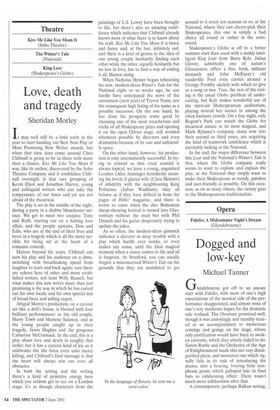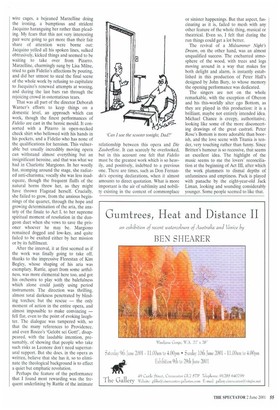Opera
Fidelio; A Midsummer Night's Dream (Glyndebourne)
Dogged and low-key
Michael Tanner
Glyndebourne got off to an uneasy start with Fidelio, with most of one's high expectations of the musical side of the performance disappointed, and almost none of one's very moderate hopes for the dramatic side realised. The Overture promised well, though it was annoyingly and trendily treated as an accompaniment to mysterious comings and goings on the stage, whose only justification would have been to awaken curiosity, which they utterly failed to do. Simon Rattle and the Orchestra of the Age of Enlightenment made this not very distinguished piece, and moreover one which signally fails in its task of introducing the drama, into a bracing, braying little symphonic poem, which galloped into its final bars to exhilarating effect. There wasn't much more exhilaration after that.
A contemporary, perhaps Balkan setting, wire cages, a bejeaned Marzelline doing the ironing, a bumptious and strident Jacquino haranguing her rather than pleading. My fears that this not very interesting pair were going to get more than their fair share of attention were borne out: Jacquino yelled all his spoken lines, sulked obtrusively, kicked things and seemed to be waiting to take over from Pizarro. Marzelline, charmingly sung by Lisa Milne, tried to gain Fidelio's affections by pouting, and did her utmost to steal the final scene of the whole work by refusing to capitulate to Jacquino's renewed attempts at wooing, and during the last bars ran through the rejoicing crowd in ostentatious tears.
That was all part of the director Deborah Warner's efforts to keep things on a domestic level, an approach which can work, though the finest performances of Fidelio are cast in the heroic mould. It consorted with a Pizarro in open-necked check shirt who bellowed with his hands in his pockets, and a Fidelio who has none of the qualifications for heroism. This vulnerable but usually incredibly moving opera can withstand almost everything but an insignificant heroine, and that was what we had in Charlotte Margiono. In her woolly hat, stomping around the stage, she radiated anti-charisma; vocally she was less inadequate, though the frequent fluffs of the natural horns threw her, as they might have thrown Flagstad herself. Crucially, she failed to grow, from the anxious beginnings of the quartet, through the hope and growing determination of the aria, the anxiety of the finale to Act I, to her supreme spiritual moment of resolution in the dungeon duet when she vows to save the prisoner whoever he may be. Margiono remained dogged and low-key, and quite failed to be exalted either by her mission or by its fulfilment.
After the interval, it at first seemed as if the work was finally going to take off, thanks to the impressive Florestan of Kim Begley, whose shaping of his aria was exemplary. Rattle, apart from some artfulness, was more elemental here too, and got his orchestra to play with the balefulness which alone could justify using period instruments. The direction was thrilling, almost total darkness penetrated by blinding torches; but the rescue — the only moment of action in the entire opera, and almost impossible to make convincing — fell flat, even to the point of evoking laughter. The dialogue was tampered with, so that the many references to Providence, and even Rocco's `Gelobt sei Gott!', disappeared, with the laudable intention, presumably, of showing that people who take such risks as Leonore don't need supernatural support. But she does, in the opera as written, believe that she has it, so to eliminate the theological background is to effect a quiet but emphatic revolution.
Perhaps the feature of the performance that I found most rewarding was the frequent underlining by Rattle of the intimate
relationship between this opera and Die Zaubeiflote. It can scarcely be overlooked, but in this account one felt that Fidelio must be the greatest work which is so heavily, and positively, indebted to a previous one. There are times, such as Don Fernando's opening declarations, when it almost amounts to direct quotation. What is more important is the air of sublimity and nobility existing in the context of commonplace
or sinister happenings. But that aspect, fascinating as it is, failed to mesh with any other feature of the whole thing, musical or theatrical. Even so, I felt that during the run things could get a lot better.
The revival of a Midsummer Night's Dream, on the other hand, was an almost unqualified success. The enchanted atmosphere of the wood, with trees and logs moving around in a way that makes for both delight and alarm, is instantly established in this production of Peter Hall's designed by John Bury, to whose memory the opening performance was dedicated.
The singers are not on the whole remarkable, with the exception of Oberon and his this-worldly alter ego Bottom, as they are played in this production: it is a brilliant, maybe not entirely intended idea. Michael Chance is creepy, authoritative, looking like some of the more disconcerting drawings of the great castrati. Peter Rose's Bottom is more adorable than boorish, and the love scene with Titania is tender, very touching rather than funny. Since Britten's humour is so recessive, that seems an excellent idea. The highlight of the music seems to me the lovers' reconciliation at the beginning of Act III, after which the work plummets to dismal depths of unfunniness and emptiness. Puck is played with panache by the eight-year-old Jack Liman, looking and sounding considerably younger. Some people seemed to like that.











































































 Previous page
Previous page